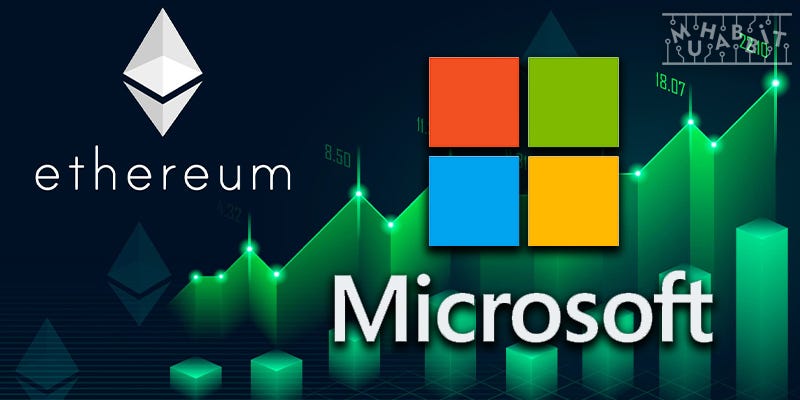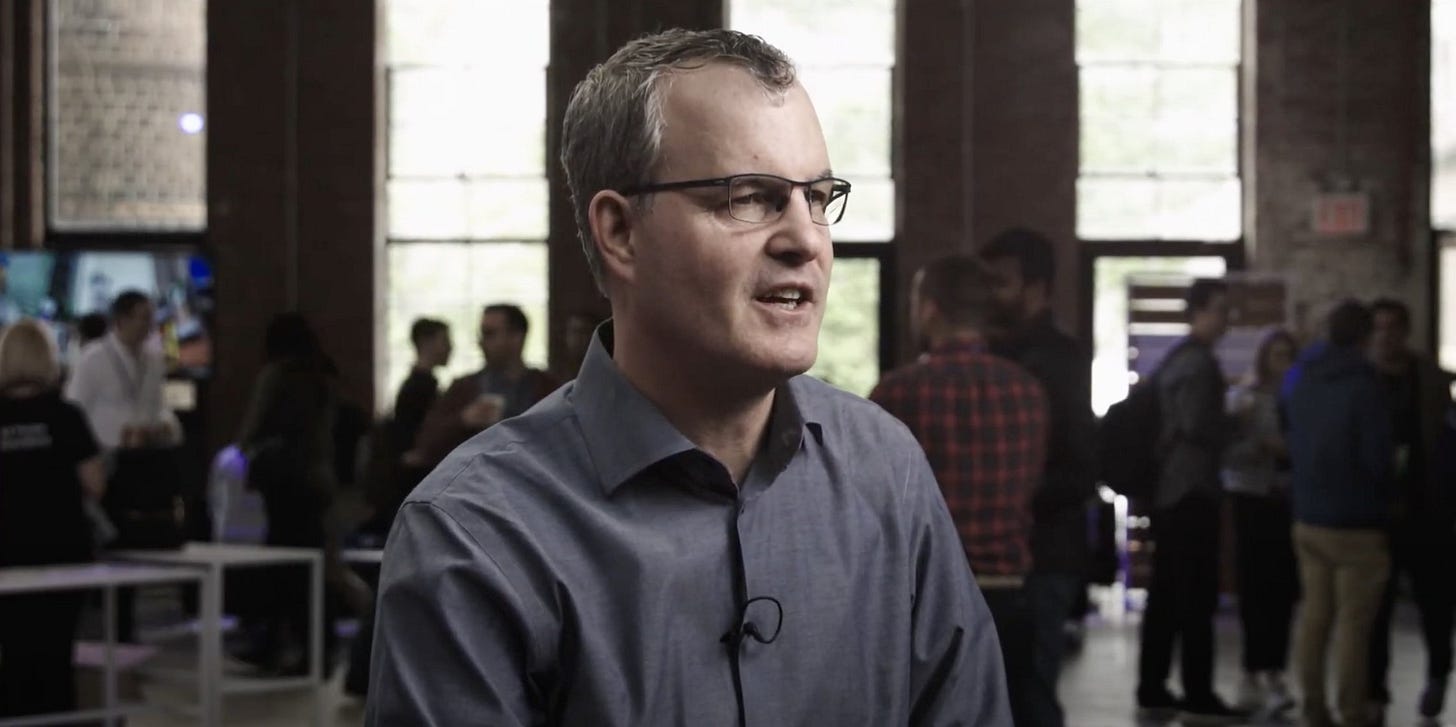Ethereum Will Become the “Decentralized App Store” in 2023
The Metaverse and DeFi Platforms of Scale Unite in the Near Future
This is an Op-Ed about how Web3 and the Metaverse will unite in the near future. There’s a bearish argument to be made about all of this even as Bitcoin has gone to the moon since the pandemic began.
There’s been a lot of blockchain hype in the past decade, but it hasn’t really amounted to much but Billionaires hijacking crypto markets and ownership. So very decentralized?
I check Coinmarketcap daily, and I feel like I’m on a gambling website checking my horses or sports games. NTFs, DeFi and blockchian platforms are all wonderful places to store the added liquidity the Fed created in massive QE since 2020.
With rising inflation, a Great Resignation and mounting wealth-inequality and minority unemployment rates, not to mention shrinking labor participation rates, that sure turned out well.
We live in world that considers Bitcoin today as a form of digital gold, a digital asset with actual value, due to some warped supply-demand ponzi scheme.
However with massive institutional money coming into Bitcoin in the 2nd Bitcoin rally, the race to consolidate it into new cash-cows is near. It will also coincide with a great Metaverse movement, a reaching within (into VR and gaming and WFM) of a stale and broken internet we have today.
Web3 Hype is Real
Yorke Rhodes, Microsoft’s Director of Digital Transformation for the past seven years, has boldly predicted that Etherum will become the new decentralized App Store, or flagship marketplace of the new Web3, in just two years.
Rhodes argued that ETH has low fees compared to Apple’S return on Apple Store profit sharing. He added that there is no single point of control by a large company. But is this a correct or an unbiased prediction?
What was once a decentralized movement has turned into the scramble to monetize and scale Web3. Powerful venture capitalists, banks (and their young talent) and BigTech are all participating in the blockchain revolution now where DeFi goes from dream to implementation.
Web3, also known as Web 3.0, is an idea for a new iteration of the World Wide Web that incorporates decentralization based on blockchains. … It is often contrasted with Web 2.0, wherein data and content are centralized in a small group of companies sometimes referred to as “Big Tech”.
App stores are some of the most consolidate and least “decentralized” moated kingdoms (read duopolistic cash-cows) in technology today. To even use “app store” and “decentralized” in the same sentence is nearly impossible (and somewhat contradictory). I’m pretty skeptical Ethereum, Solana or Terra (insert other) will end up as anything very decentralized.
It doesn’t matter if your products are decentralized if the ownership structure around them is not. Silicon Valley propaganda has been active here. Boomers scam GenZ at regular intervals, and a lot of their promises haven’t just been false advertising but have permanently damaged society.
But when a top-ranking executive at Microsoft touts Ethereum to be the de facto app store in the future. Dapps anyone? Decentralized applications (dApps) are digital applications or programs that exist and run on a blockchain or peer-to-peer (P2P) network of computers instead of a single computer. DApps (also called “dapps”) are outside the purview and control of a single authority. But how about the ownership of the companies behind the app-stores or the VCs that got into them early?
Decentralization Has Already Failed in 2022
A lot of the promises of crypto about the democratization of finance haven’t materialized at all.
This bold prediction also implies that Rhodes believes Ethereum will scale over the next two years, presumably through updates and rollups. And on top of that, Ethereum has other advantages, as there is no “trade blocking for Apple, no single point of control by a large company; the Ethereum network is distributed, decentralized, has single sign-on to applications, as well as payments, identity and P2P commerce”.
Do Coinbase, Robinhood, Binance or Ethereum really sound that decentralized to you?
The future app-stores of crypto or super-apps for that matter, will simply be firms with new clothing. Ownership of Bitcoin, Ether and other alt coins suggest crypto is just a really good investment for the world’s financial elite and a way to accelerate their earnings over time with the least amount of effort.
Young people suffer from housing unaffordability, inflation, generational disruption due to automation and a changing work-force culture and don’t have the money to invest in the stock market or crypto market due to high student loans.
The people crypto is supposed to represent, that movement, is and has been completely hijacked. People like Jack Dorsey or Elon Musk are part of the problem, not sadly the solution.
Will the Metaverse even be decentralized? How can it be when its primary contributors will be Apple, Microsoft and Facebook? Ethereum can scale, or be disrupted, and it won’t really matter.
Some current Web2 titans have already hinted that if they were building the internet from scratch, they would definitely incorporate crypto into the draft of this project. Others therefore hope that the new wave, the metaverse or web3, has crypto somewhere. But has crypto been good for society?
Over $7.7 billion stolen in crypto scams in 2021
Bitcoin and cryptocurrencies are still a badly protected space of incredible fraud. Over $7.7 billion was stolen in cryptocurrency scams worldwide in 2021, according to a new report by blockchain analytics firm Chainalysis. That’s an 81% rise compared to 2020.
Rug pulls, a type of scam where developers abandon a project and leave with investors’ funds, became the “go-to scam” of the decentralized finance, or DeFi, ecosystem, Chainalysis wrote in its report.
In 2021, rug pulls accounted for over $2.8 billion stolen, or 37% of all cryptocurrency scam revenue, compared to 1% in 2020. What has Blockchain done for me lately? The trading fees on Coinbase are absurd, who would actually use their app? Do I really want to trust Binance with my money? A company with such deep regulatory and legal woes?
Ether? A current that went from being valued $132 in March, 2020 to $4,062 today? Can I trust volatility like that or that an app-store for DApps would indeed be decentralized?
A lot of the crypto metrics including wallet numbers or the uptake of DeFi and NTFs, can they be trusted?
Microsoft Executive Weighs In
Yorke Rhodes, the Director of Digital Transformation at Microsoft has hailed Ethereum’s stellar features and has predicted the network to be the go-to hub for apps by 2023.
As the world inexorably marches towards a decentralized future, DApps are beginning to rise in popularity and according to Dapps Radar, there are over 9,000 decentralized applications in existence. But do they do anything useful for the world or the world of business?
Do we even want duopolistic app-stores to dominate an era that’s supposedly more decentralized and democratic when BigTech consolidation and the financial elite have never been so powerful? It seems more like BigTech’s vision for what crypto will become than the young people who got excited about crypto in the first place all those years ago and since 2009.
Last month, Apple CEO Tim Cook finally took the trouble, after so many years, to tell the world that he has been investing in Bitcoin and other cryptocurrencies. The bro culture has been boosting Bitcoin all of this time, as if we didn’t know that right?
Silicon Valley will Marry DeFi with the Metaverse and Call is “Decentralized”
Meta and Microsoft are following the trend. Zuckerberg wanted digital coins in his hands, but something like identity or ownership is no different than a decentralized public blockchain owned and controlled by the community. Because of this, the development of Libra, stablecoin from the old Facebook, was reformulated and now even has another name.
Microsoft is more ambitious in the Metaverse than you think, and clearly have their hands into crypto, if this is coming from a high-ranking executive. Did our Overlords at Microsoft invest a lot in Ether in the early days?
Rhodes’ prediction of 2023 might be tied to the Ethereum network’s transition from Proof-of-Work to Proof-of-Stake that will usher in a new era for the network.
The transition is viewed as a major solution to the nagging problem of scaling and the high gas fees associated with Ethereum in recent months. Already, Ethereum’s co-founder Vitalik Buterin has proposed some short-term scaling solutions for the network.
As we head into 2020, the future of crypto, DeFi and NTFs has never looked so un-decentralized. It’s a major failure for the scam of the ideology behind Bitcoin, even as Jack Dorsey’s Block continues to find ways to monetize the greed of young people in the crypto movement.
Even as Elon Musk keeps pumping altcoins that have no reason for being that volatile. The financial elite have destroyed what crypto was supposed to bring the world and they will cut up the pieces in the new kingdoms of the blockchain Metaverse.
Microsoft’s Director of Digital Transformation agrees that Web3 is still a niche and as we end 2021 there’s a lot of speculation about both the Metaverse and how Web is incorporated into it. A lot of this speculative and a lot of it guided by powerful BigTech forces. Microsoft got its hands into Ethereum at least as early as 2015.
I thought Crypto was about the liberation of young people from the bankers. Instead we have Boomers predicting how DeFi and Dapps will consolidate. Great stuff America.




